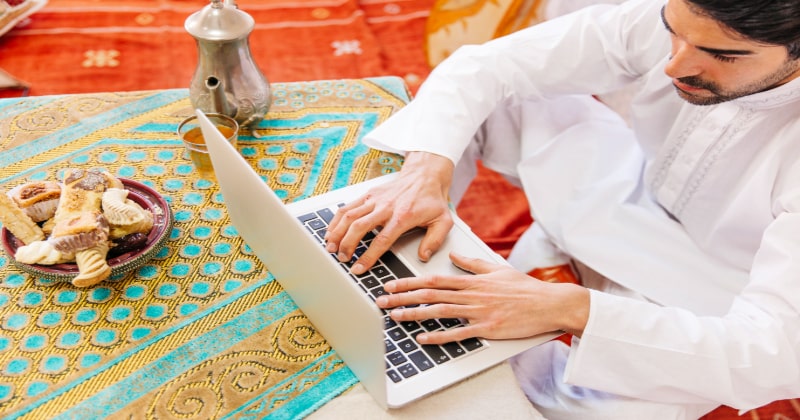
In an era where digital communication bridges continents, many Muslims are turning to remote spiritual services to seek healing and relief. Among these, ruqyah— Qur’anic healing—is increasingly being performed via phone calls and online sessions. This shift raises an important question: Is ruqyah over the phone religiously valid? Can spiritual healing be effective without physical presence?
In this blog post, we will explore the Islamic legitimacy of remote ruqyah, provide scholarly opinions that support its permissibility, and highlight the benefits of using technology to facilitate this sacred practice. Our goal is to provide clarity for those seeking spiritual healing from a distance, especially in times of physical illness, isolation, or geographical constraints.
UNDERSTANDING RUQYAH IN ISLAM
Ruqyah refers to the recitation of specific verses from the Qur’an, along with prophetic supplications, for the purpose of seeking protection or healing from physical and spiritual ailments. Traditionally, ruqyah is performed in person, with the healer reciting verses while placing a hand on the patient (if permissible) or blowing lightly after the recitation.
However, the core essence of ruqyah lies not in physical touch, but in the recitation itself—the power of the Qur’an and the sincerity of intention. As such, the physical proximity of the healer to the patient is not inherently necessary for the spiritual benefit to manifest.
SCHOLARLY OPINIONS ON REMOTE RUQYAH
Islamic scholars have long affirmed the importance of intention, sincerity, and the power of the Qur’anic word in ruqyah. When it comes to modern means of communication, many scholars agree that ruqyah done via phone or digital platforms is permissible, provided the necessary conditions of ruqyah are met.
Renowned scholars and contemporary fatwa committees—including those from Saudi Arabia, Egypt, and other parts of the Muslim world—have issued rulings stating that ruqyah over the phone is allowed. Their reasoning is grounded in several key principles:
1. The Effectiveness of Qur’anic Words: The healing power lies in the words of Allah, not in the medium. Whether those words are heard in person or through a speaker, they retain their barakah (blessing).
2. Facilitating Healing for the Ummah: In situations where the sick person cannot physically attend due to distance, health, or other reasons, ruqyah over the phone provides a practical solution without compromising the sanctity of the practice.
3. No Textual Prohibition: There is no evidence in the Qur’an or Sunnah that forbids ruqyah from being conducted through indirect means. In fact, Islamic law often embraces modern tools when they serve a halal purpose.
DIGITAL COMMUNICATION AND HEALING IMPACT
In the digital age, much of our emotional and intellectual exchange occurs remotely. Just as we are affected by kind words in a voice message or a heartfelt phone call, the Qur’an can reach our souls through digital means. The Prophet Muhammad (peace be upon him) emphasized the power of spoken words, and Islamic history has always prioritized the transmission of sacred knowledge through sound.
Phone-based ruqyah taps into this very principle. The patient hears the recitation, responds to it, and experiences its spiritual and emotional impact. In many documented cases, people have reported relief, emotional release, and even physical improvements after a ruqyah session done remotely.
BENEFITS OF REMOTE RUQYAH
Remote ruqyah offers several significant benefits that make it a valuable option for many Muslims today:
1. Accessibility: Muslims in remote areas or non-Muslim countries often lack access to qualified ruqyah practitioners. Phone-based services bridge this gap.
2. Privacy and Comfort: Some individuals feel more at ease receiving ruqyah in the privacy of their homes, especially when dealing with sensitive personal or spiritual issues.
3. Time-Efficiency: Scheduling and attending in-person sessions can be time-consuming. A phone call offers flexibility for both the healer and the one seeking help.
4. Safety in Health Crises: During pandemics or when contagious illnesses spread, remote ruqyah provides a safe and effective alternative.
5. Global Reach: Practitioners can serve clients from around the world, expanding the reach of Islamic healing.
COMMON MISUNDERSTANDINGS
Some critics argue that ruqyah must be done face-to-face to be effective, citing tradition rather than evidence. However, this perspective overlooks the adaptability of Islamic practices within the bounds of Shariah. Islam has always embraced tools that serve the ummah—printing presses, microphones, and even apps—to spread knowledge and facilitate worship.
Another misunderstanding is that spiritual connection cannot be formed over a call. Yet, the Qur’an itself was transmitted orally over distances, and generations of Muslims learned and felt its power without always being in the physical presence of the reciter.
FINAL THOUGHTS
Remote ruqyah through phone calls is a valid, effective, and spiritually grounded option for those seeking healing in today’s world. Backed by scholarly consensus and supported by the core principles of Islam, it honors the intention of the seeker and the power of divine speech. In moments of distress, when physical barriers exist, technology becomes not a hindrance—but a means of mercy.
If you or a loved one is in need of spiritual relief and unable to attend an in-person session, don’t hesitate to explore the benefits of remote ruqyah. With the right intention, sincerity, and trust in Allah, healing can reach the heart no matter the distance.

